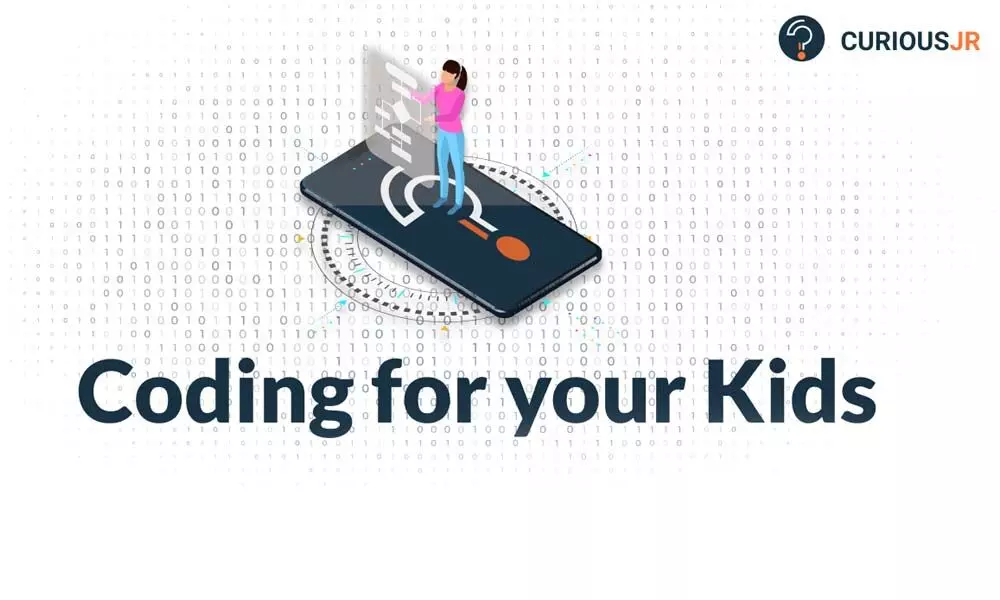CuriousJr envisions and innovates coding on small displays for students

CuriousJr envisions and innovates coding on small displays for students
CuriousJr aims to create the most trusted learning platform that offers technology-assisted, impact-based learning to 500 million kids globally by 2030.
Curiosity EdTech Private Limited (CuriousJr) is a Gurugram-based online platform founded in September 2020 to enable code learning for children between 8 and 17. It is mobile-first, provides lessons in vernacular languages, and enables publishing and sharing of creations by students within the larger community. CuriousJr aims to create the most trusted learning platform that offers technology-assisted, impact-based learning to 500 million kids across the globe by 2030.
Mridul Ranjan Sahu, Co-Founder of CuriousJr
Mridul Ranjan Sahu, Co-Founder of CuriousJr, interacted with The Hans India and shared his idea about how they aim to be a part of 100 million young coders and provide them with the most satisfactory learning experience ever in the next five years.
How was curiousJr founded?
CuriousJr started with the idea of enabling students without laptops to learn to code on their mobiles. The team is envisioning and innovating coding on small displays to enable students to study and code on mobile devices.
Ali, Amit, and I have known each other for 11 years and have worked or lived together since then. We wanted to make a difference in the education sector, which is essential to us because education is one of the most significant aspects of our lives. We wanted to bring this into every student's life, which pushed us to solve the problem of coding education for the masses. Coding education has enabled us to perceive the problem statement through a different lens and solve it for a sustainable solution.
From Left to Right - Janishar Ali, Mridul Ranjan Sahu and Amit Shekhar - Co-Founders of CuriousJr
CuriousJr started with the idea of enabling students without laptops to learn to code on their mobiles since 88% of K-12 students in India do not have access to laptops. During the lockdown, three of us got on a Zoom call and started writing down challenges we could address that would empower children all across the world. CuriousJr was born out of this need for a mobile solution for K12 children to learn coding.
We planned the MVP and launched our first product within three months of that zoom call in September 2020. First, the CuriousJr App Store was created so that children could publish and share their work with their friends and family. Later, a competition platform was developed so that students could compete with their fellow coders to see where they were in the ecosystem.
Share about funding and expansion plan for CuriousJr.
We have raised 1 million dollars in the seed round of funding. More than 180K students are currently learning to code on mobile devices each month. We look forward to taking it to 500K monthly students this year. Run Code is a metric we track which tells us the number of times a code has been run on CuriousJr. Students have run code more than 14 million times on CuriousJr and published more than 350K apps on the CuriousJr app store.
Do you think online education will be the default mode for education in India? Are we ready for this transformation?
Online education has become an essential part of students' educational journey, which opens the market for the EdTech industry to reach millions of students across all sectors. Smartphone EdTech is reaching the masses without any restrictions of geography, which allows companies to provide quality education to every student. Since COVID 19, EdTech adoption has accelerated since there was no option to study offline. What was expected in 2025 has come five years earlier. This also creates some challenges for EdTech to scale and create quality content rapidly.
How is your platform different from existing platforms?
We are focused on making coding accessible for everyone by innovating practice-led coding on mobile phones and making learning effective with vernacular content. India has 88% of students out of 270 million who do not have access to laptops. To help everyone learn to code, we need to bring innovative solutions that are compatible with our system; hence CuriousJr is solving for the masses to learn coding. Mobile brings in scalable solutions that have the capability to educate more than 100 million students at a time. CuriousJr's goal is to bring 100 million K-12 students onto the platform in the next five years.
What are the challenges that you came across during the Pandemic?
Yes, the Pandemic brought a lot of challenges where the team had to deal with the virus and its effects on mental and physical, and at the same time, we all wanted to bring the right solution for kids to learn to code. So, as we realised every kid wanted to learn coding by not having laptops was the major challenge, we innovated CuriousJr for Kids to learn to code on mobile.
What can we expect in future for the EdTech industry?
With the help of mobile phones, we expect quality education to reach every corner of the country in the upcoming years. Such an education approach will increase the skills of the younger students and make them ready for future endeavours.
How is India becoming an EdTech capital?
India has proved its mettle in the fintech industry by creating scalable technology. Similarly, Edtech is growing every day, and India can solve problems that are acceptable globally. In 2020, Indian EdTech start-ups raised more than $1.43 billion in 100 deals. In addition, both parents and educational institutions were pushed to implement tech-enabled learning solutions due to the COVID-19 pandemic disruptions and subsequent lockdowns, making EdTech the most well-funded sector in the country.




